The Legislative Yuan is to vote on President Tsai Ing-wen’s (蔡英文) nominations for the Control Yuan on July 17 after Democratic Progressive Party (DPP) legislators regained access to the legislative chamber yesterday after it was occupied by Chinese Nationalist Party (KMT) lawmakers for about 19 hours.
The Legislative Yuan had been scheduled to meet yesterday morning to discuss its planned extraordinary session, but more than 20 KMT lawmakers on Sunday afternoon broke into the main chamber and occupied the legislative speaker’s podium to protest Tsai’s nomination of former Presidential Office secretary-general Chen Chu (陳菊) to be Control Yuan president.
The KMT caucus asked whether Chen was qualified, given that during her tenure as Kaohsiung mayor from 2006 to 2018, the Control Yuan launched 58 investigations into her team, including 30 cases of corrective measures and three impeachments.
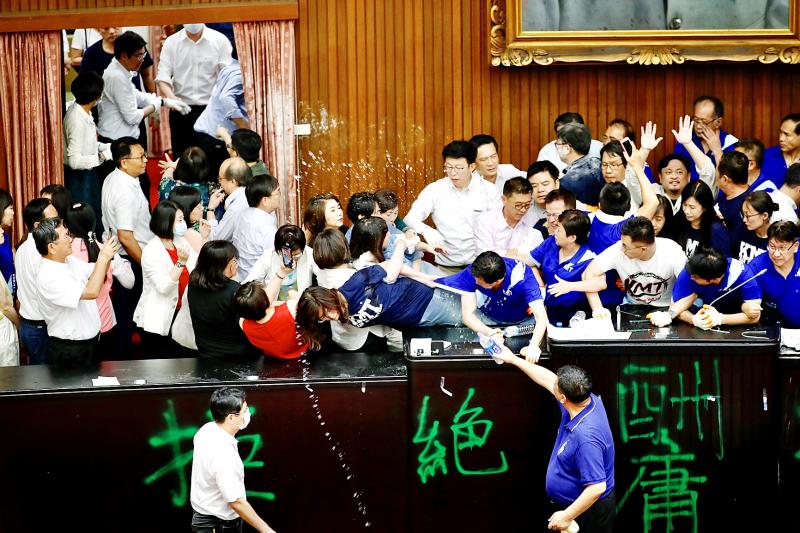
Photo: Ritchie B. Tongo, EPA-EFE
The KMT lawmakers blocked entry to the main chamber with chairs and chains, but their occupation ended at about 11:15am when DPP legislators broke the chains with bolt cutters.
DPP and KMT legislators scuffled for about an hour before the KMT lawmakers retreated.
Legislative Speaker You Si-kun (游錫堃) entered the chamber at about 12:20pm, while KMT legislators shouted chants calling for the withdrawal of Chen’s nomination.
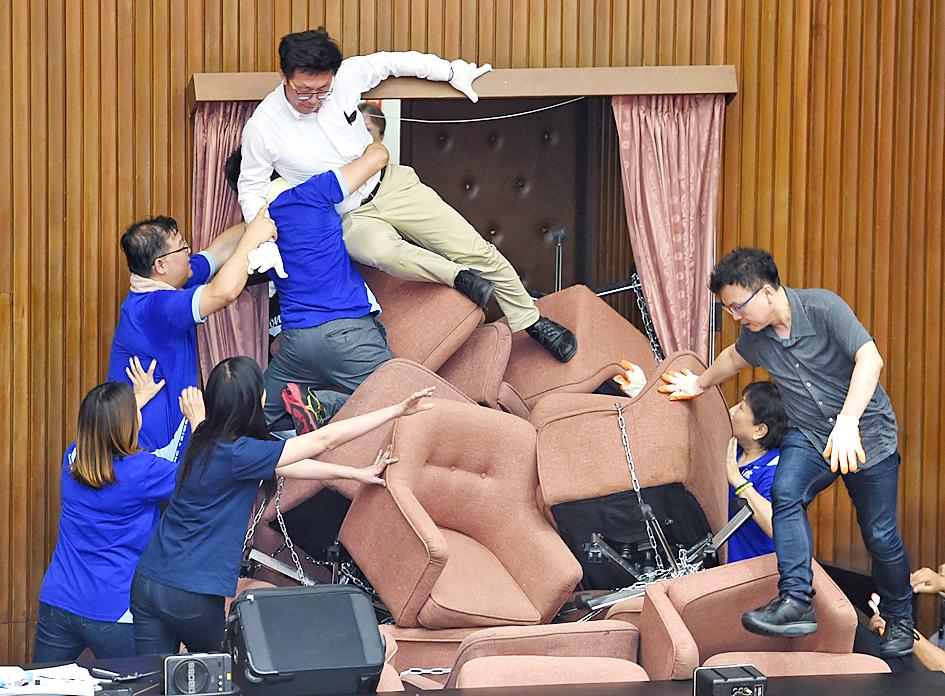
Photo: Liu Hsin-de, Taipei Times
The DPP caucus proposal to hold an extraordinary session from yesterday to July 22 passed 46-28.
The DPP caucus’ proposals to vote on the Examination Yuan and Control Yuan nominations, on Friday next week and July 17 respectively, also passed.
DPP caucus whip Ker Chien-ming (柯建銘) said that it is impossible for the caucus to accept KMT lawmakers’ demand that Chen’s nomination be dropped, and he accused the KMT of resorting to an “attack approach” with baseless accusations against Chen.
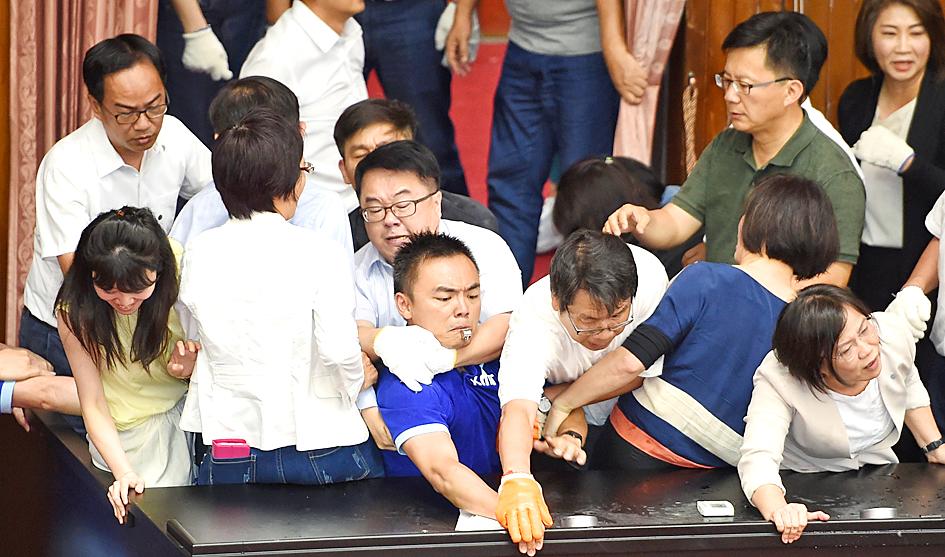
Photo: Liu Hsin-de, Taipei Times
Speaking to reporters outside the legislative chamber at about 1pm, KMT Legislator Hung Mong-kai (洪孟楷) accused DPP lawmakers of seizing him by the neck during a scuffle inside.
Hung asked if Tsai, who doubles as DPP chairperson, approved of what he described as “homicidal violent behavior” by DPP lawmakers and called on her to apologize.
KMT Legislator Chiang Wan-an (蔣萬安) condemned DPP lawmakers’ actions against Hung on behalf of the KMT caucus, adding that Sunday’s occupation was “just the beginning,” and KMT lawmakers would continue to “stand on the side of the people” and “defend democracy [and] justice.”
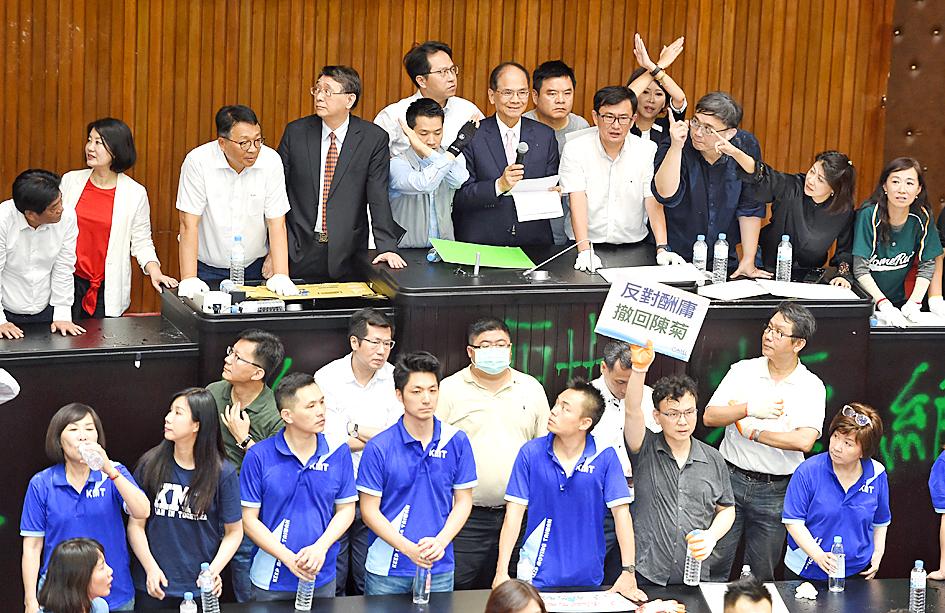
Photo: Liu Hsin-de, Taipei Times
Speaking to supporters from a raised platform on a truck parked outside the Legislative Yuan, KMT Chairman Johnny Chiang (江啟臣) said that KMT lawmakers are prepared to return to the legislative chamber “anytime.”
The sides of the truck were covered with posters printed with the words, “Democracy is dead” and “Tyranny must die.”
At about 3:30pm, KMT lawmakers attempted to take over the podium inside the legislative chamber, but were blocked by DPP legislators.
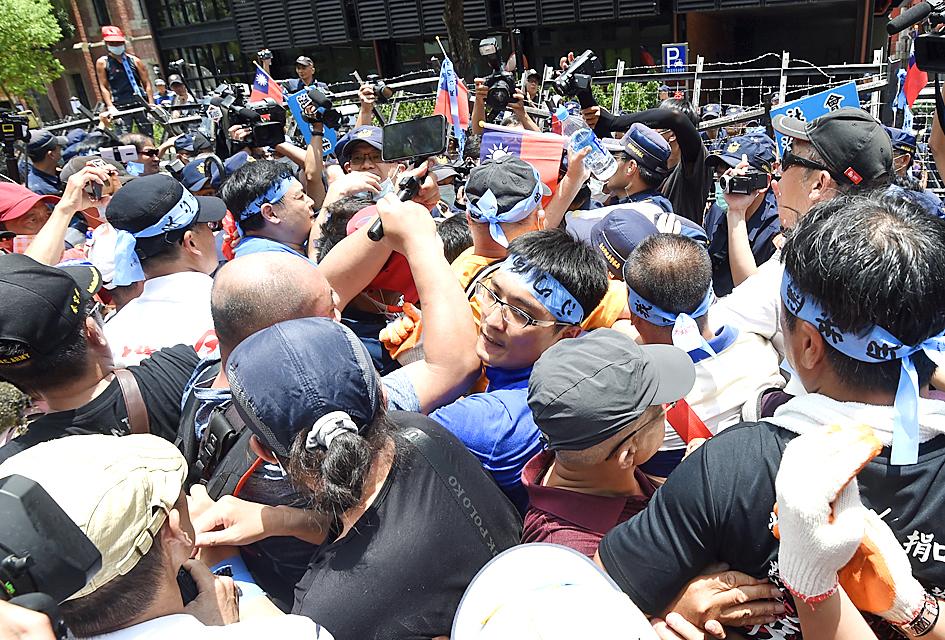
Photo: Chien Jung-fong, Taipei Times
DPP Legislator Chung Chia-pin (鍾佳濱) said that to ensure that the extraordinary session runs smoothly, DPP lawmakers would take turns standing guard outside the legislative chamber.
Additional reporting by CNA, Lin Liang-sheng and Hsieh Chun-lin

SECURITY: As China is ‘reshaping’ Hong Kong’s population, Taiwan must raise the eligibility threshold for applications from Hong Kongers, Chiu Chui-cheng said When Hong Kong and Macau citizens apply for residency in Taiwan, it would be under a new category that includes a “national security observation period,” Mainland Affairs Council (MAC) Minister Chiu Chui-cheng (邱垂正) said yesterday. President William Lai (賴清德) on March 13 announced 17 strategies to counter China’s aggression toward Taiwan, including incorporating national security considerations into the review process for residency applications from Hong Kong and Macau citizens. The situation in Hong Kong is constantly changing, Chiu said to media yesterday on the sidelines of the Taipei Technology Run hosted by the Taipei Neihu Technology Park Development Association. With

A US Marine Corps regiment equipped with Naval Strike Missiles (NSM) is set to participate in the upcoming Balikatan 25 exercise in the Luzon Strait, marking the system’s first-ever deployment in the Philippines. US and Philippine officials have separately confirmed that the Navy Marine Expeditionary Ship Interdiction System (NMESIS) — the mobile launch platform for the Naval Strike Missile — would take part in the joint exercise. The missiles are being deployed to “a strategic first island chain chokepoint” in the waters between Taiwan proper and the Philippines, US-based Naval News reported. “The Luzon Strait and Bashi Channel represent a critical access

‘FORM OF PROTEST’: The German Institute Taipei said it was ‘shocked’ to see Nazi symbolism used in connection with political aims as it condemned the incident Sung Chien-liang (宋建樑), who led efforts to recall Democratic Progressive Party (DPP) Legislator Lee Kun-cheng (李坤城), was released on bail of NT$80,000 yesterday amid an outcry over a Nazi armband he wore to questioning the night before. Sung arrived at the New Taipei City District Prosecutors’ Office for questioning in a recall petition forgery case on Tuesday night wearing a red armband bearing a swastika, carrying a copy of Adolf Hitler’s Mein Kampf and giving a Nazi salute. Sung left the building at 1:15am without the armband and apparently covering the book with a coat. This is a serious international scandal and Chinese

COUNTERINTELLIGENCE TRAINING: The ministry said 87.5 percent of the apprehended Chinese agents were reported by service members they tried to lure into becoming spies Taiwanese organized crime, illegal money lenders, temples and civic groups are complicit in Beijing’s infiltration of the armed forces, the Ministry of National Defense (MND) said in a report yesterday. Retired service members who had been turned to Beijing’s cause mainly relied on those channels to infiltrate the Taiwanese military, according to the report to be submitted to lawmakers ahead of tomorrow’s hearing on Chinese espionage in the military. Chinese intelligence typically used blackmail, Internet-based communications, bribery or debts to loan sharks to leverage active service personnel to do its bidding, it said. China’s main goals are to collect intelligence, and develop a